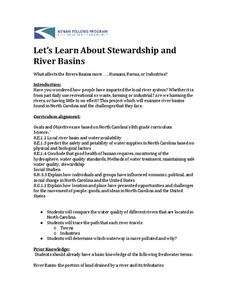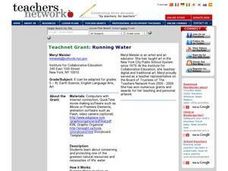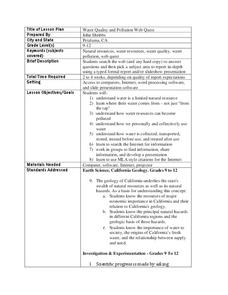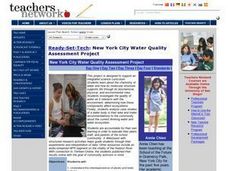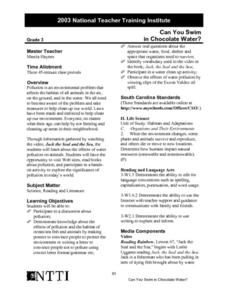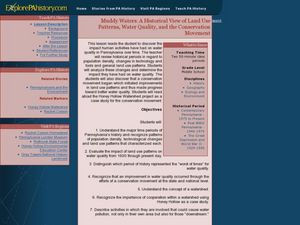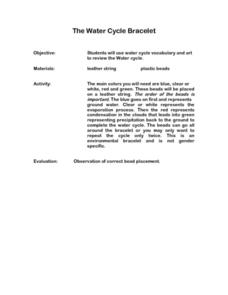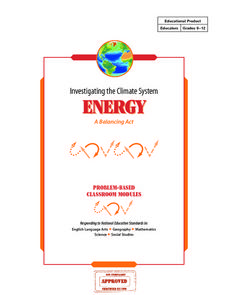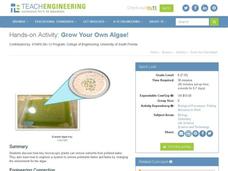Kenan Fellows
Let's Learn About Stewardship and River Basins
What does it mean to be a good steward? Middle school environmentalists learn to care for their state's waterways through research, a guest speaker, and poster activity. Groups must locate and learn more about a river basin and the human...
NOAA
The Dead Zone
The fifth installment of a 23-part NOAA Enrichment in Marine sciences and Oceanography (NEMO) program defines dead zones and how they form. Pupils then examine data from the Gulf of Mexico to determine dead zone formation.
NOAA
Technology I
Isn't technology great? The 12th installment of a 23-part NOAA Enrichment in Marine sciences and Oceanography (NEMO) program introduces technology that marine scientists use. Pupils take part in an activity using conductivity,...
Curated OER
The Water Detectives
Pupils collect water samples from designated sampling stations, and discuss water pollution. They analyze the water samples, record the data on a spreadsheet, and present the environmental water quality data to the class.
Curated OER
Running Water
Sixth graders create products that feature the importance of water conservation. In this environmental stewardship lesson, 6th graders explore the water cycle and conduct on water usage. Students also research water pollution and...
Curated OER
Water Quality and Pollution Web Quest
Learners explore how water is a limited resource, where it comes from, how it can become polluted and how it is used. In this water quality instructional activity students search the web to answer given questions and prepare a report...
Curated OER
New York City Water Quality Assessment Project
Young scholars investigate the chemistry of water and how its molecular structure supports life through its biochemcial, physical, and environmental roles. They investigate the quality of water as it interacts with the environment. ...
Curated OER
Who Will Care for the Water?
Students discover how humans impact natural resources. In this environmental instructional activity, students identify water resources in the local area and construct a T-chart to compare the positive and negative effects humans have on...
Curated OER
Water Resources and the Role of the Independent Sector
Students identify the need to maintain and protect our natural resources. In this natural resource lesson plan, students study pictures of the effects of pollution on animals and water. Students brainstorm a list of ways water is an...
Curated OER
Geographic Information Systems (GIS) and Water Resources
Students demonstrate how water quality and environmental health issues can be analyzed together, how hydrologic information can be built up, and how decisions can be made using GIS.
Curated OER
Water Properties introduction
Students list items they know and want to know about water on personal K-W-L charts. They describe what happened during the warm up activity in their science journal. Students travel to four different stations and perform the different...
Curated OER
Can You Swim in Chocolate Water?
Third graders discss water pollution and its affects on animals. They watch a demonstration using a plastic fish in a fish bowl in which various types of water pollution are illustrated.
Curated OER
Earth Science
Students explore how water and waves erode the earth. In this erosion lesson students determine the processes of wave erosion and building.
Curated OER
Water Pollution - Group Presentation
Pupils investigate water pollution at a web site and apply it toward a group presentation.
Curated OER
Where Do We Get Clean Water?
Students investigate the concept of a filter. They use simple supplies in order to construct one after watching a demonstration performed by the teacher. An important warning that the project water is not clean for drinking is included....
Curated OER
Muddy Waters: A historical view of land use patterns, water quality, and the conservation movement
Students research the impact that human activity had on Pennsylvania's water supply over time. In this water quality lesson plan, students research, discuss, and write about how Pennsylvania's water quality has been affected and what...
Curated OER
No Impact Project: Water
Students use the "No Impact Project" to analyze the consumption of water. In this water consumption lesson, students discuss the pros and cons of tap water or bottled water. Students read about chemicals in water and watch a video clip...
Curated OER
The Water Cycle Bracelet
Pupils participate in a creative project in order to investigate the water cycle. They create a bracelet with different colored beads that represent the concept and the order of its occurrence. Students are evaluated according to the...
Curated OER
Environmental Education/Water Pollution
Fifth graders play a game in which they list as many environmental issues or terms in alphabetical order. They brainstorm ways they can save the environment and create a mural that displayed research found from the internet and Encarta.
Curated OER
The Living Environment
Students explore the cycles of an ecosystem. In this environmental science lesson, students work in groups to research the nitrogen cycle, the water cycle, or the oxygen-carbon dioxide cycle. Students prepare a PowerPoint or other...
Curated OER
Watershed Tourist
Students recognize and categorize different bodies of water. In this watershed and water environments lesson, students "Follow the Water from Brook to Ocean." Students define the different bodies of water and sort from smallest to...
Wilderness Classroom
Pollution
Educate scholars on pollution—air, water, and land—with a series of lessons that begin with a thorough explanation of each type. Learners then take part in three activities to reinforce the importance of reducing pollution. They...
Curated OER
Investigating the Climate System: Energy, A Balancing Act
Earth science explorers design an experiment to demonstrate that the albedo of a surface affects its temperature. They test to find out if moisture on the surface affects temperature. They discover whether or not concrete or asphalt heat...
Teach Engineering
Grow Your Own Algae!
Develop a model of a wastewater treatment center. The last activity of the unit has pupils mix a lake water sample into a tank of water containing fertilizers. Over time, the algae from the lake water grows and removes the nutrient-rich...


